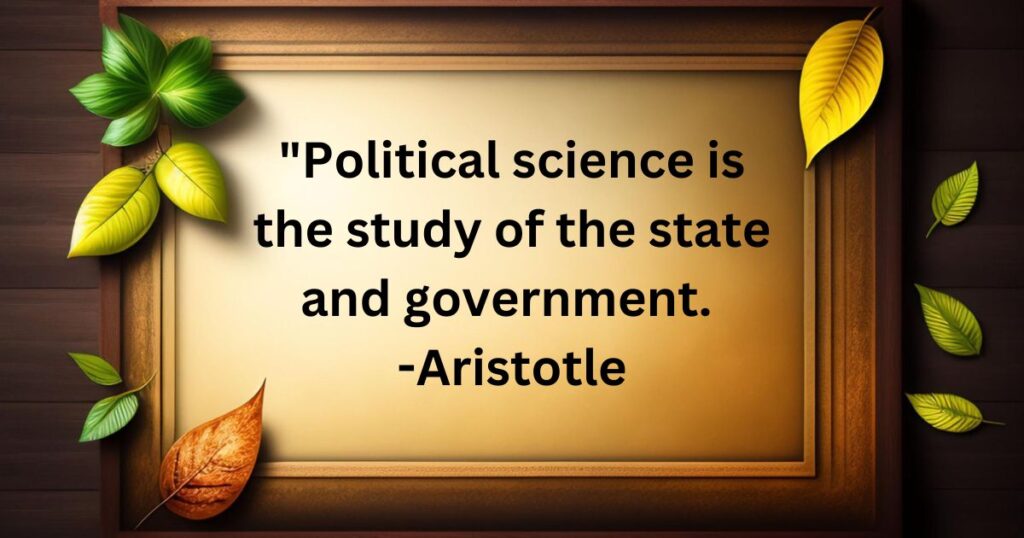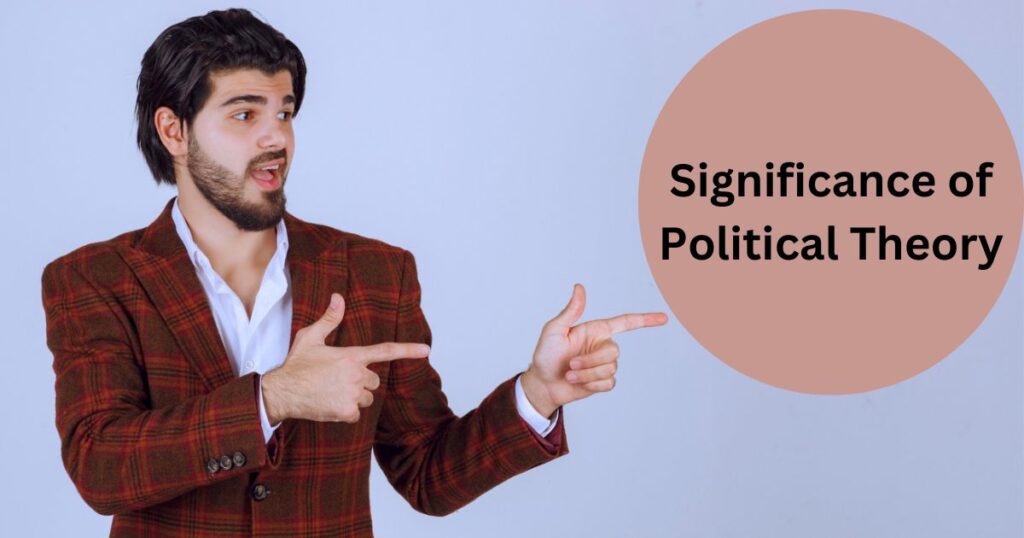Political theory is a branch of political science that explores ideas, concepts, and principles underlying political systems, behaviours, and structures. It delves into fundamental questions about governance, justice, rights, and the role of individuals and institutions in society. Below is a detailed explanation covering its meaning, nature, and significance:
Meaning of Political Theory
Political theory refers to the study of ideas and principles that have shaped political systems and practices throughout history. It aims to understand the nature of political power, authority, governance, justice, and the rights and responsibilities of citizens. Political theory provides frameworks for analyzing political issues and offers normative guidance for political action.
Here are five definitions of political theory by renowned political thinkers:
1. Aristotle:
“Political science is the study of the state and government. Political theory is concerned with understanding the nature of human beings, the best ways to organize societies, and the virtues necessary for a good life.”
Explanation:
Aristotle viewed political theory as studying human behaviour in society, focusing on ethical and practical aspects of governance and citizenship.
2. John Locke:
“Political theory is the foundation for understanding the rights of individuals in a society. It explores the role of government in protecting these rights and the consent of the governed as the basis for political legitimacy.”
Explanation:
Locke emphasized the importance of individual rights and the social contract as core principles in political theory, advocating for limited government and the protection of life, liberty, and property.
3. Karl Marx:
“Political theory critiques existing social and political systems, focusing on class struggle and how economic structures shape political power. It aims at understanding and transforming society to achieve justice and equality.”
Explanation:
Marx’s definition of political theory revolves around the analysis of class relations and the role of economic factors in shaping political power, advocating for a revolutionary change towards a classless society.
4. Hannah Arendt:
“Political theory is the study of the human condition of plurality and how people act together in the public sphere. It is concerned with the principles of freedom, power, and the nature of political action.”
Explanation:
Arendt’s approach to political theory emphasizes the importance of human interaction and collective action in the public realm, focusing on the concepts of freedom and political participation.
5. John Rawls:
“Political theory is the search for principles of justice that can structure a fair and equitable society. It seeks to define the basic rights and duties of citizens and the proper distribution of benefits and burdens within a society.”
Explanation:
Rawls viewed political theory as a means to develop a framework for justice, advocating for fairness in social institutions and emphasizing the importance of equality and the protection of individual rights.
These definitions reflect the diverse perspectives of political thinkers on the nature and purpose of political theory, each contributing to the rich tapestry of political thought.
Key Aspects:
Ideas and Concepts:
Political theory deals with concepts like liberty, equality, justice, democracy, authority, and power.
Analytical Framework:
It offers tools and frameworks for understanding and evaluating political systems and behaviour.
Normative Guidance:
It not only describes political phenomena but also prescribes what ought to be the ideal political order.
Nature of Political Theory:
The nature of political theory is both descriptive and prescriptive. It involves analyzing political realities and suggesting ways to improve or change them. Political theory is characterized by its multidisciplinary nature, drawing on philosophy, history, sociology, economics, and law to build a comprehensive understanding of political phenomena.
Key Characteristics:
Political theory is a branch of political science that explores ideas, concepts, and principles underlying political systems, behaviours, and structures. It delves into fundamental questions about governance, justice, rights, and the role of individuals and institutions in society. Below is a detailed explanation covering its meaning, nature, and significance:
It explains and analyzes political concepts and systems as they are.
The descriptive nature of political theory refers to its role in analyzing, explaining, and understanding political phenomena as they exist in reality. Unlike normative political theory, which prescribes how political systems ought to function, descriptive political theory is concerned with the “what is” rather than the “what should be.” It seeks to objectively describe and interpret the structures, processes, behaviours, and relationships that characterize political life.

Key Aspects of Descriptive Political Theory
1. Objective Analysis:
Descriptive political theory aims to provide an unbiased, factual account of political systems and behaviors.
It involves a careful examination of political institutions, practices, and events without necessarily making value judgments about them.
The goal is to understand the mechanics of political life as they are observed in practice.
2. Understanding Political Systems:
A significant part of descriptive political theory involves the study of different types of political systems, such as democracies, monarchies, authoritarian regimes, and more.
It explores how these systems function, how power is distributed, and how decisions are made within them.
For example, descriptive theory might analyze how electoral processes work in a democracy or how power is centralized in an authoritarian state.
3. Political Behavior:
Descriptive political theory also examines the behaviour of political actors, including individuals, groups, and institutions.
This includes understanding voting patterns, political participation, leadership styles, and the role of interest groups.
By studying these behaviours, political theorists can identify patterns and trends that influence political outcomes.
4. Historical Context:
Political theory often incorporates a historical perspective to describe how political ideas, systems, and institutions have evolved.
By understanding the historical development of political systems, theorists can better explain contemporary political realities.
For instance, the evolution of democracy from ancient Greece to modern times is a key focus of descriptive political theory.
5. Comparative Analysis:
Descriptive political theory frequently employs comparative analysis to understand similarities and differences between various political systems.
By comparing different governments, policies, and political cultures, theorists can identify what works well in one context and what may fail in another.
This comparative approach helps to explain why certain political systems are more stable or successful than others.
6. Empirical Evidence:
Descriptive political theory relies heavily on empirical evidence—data gathered through observation, surveys, experiments, and historical records.
This evidence is used to support or refute theories about how political systems operate. Empirical research provides the factual basis that descriptive theory uses to build its analysis.
7. Role of Institutions:
– A key focus of descriptive political theory is the study of political institutions—such as parliaments, courts, and executive bodies—and how they function.
Descriptive theorists analyze how these institutions interact with each other, how they implement policies, and how they maintain or disrupt political stability.
8. Explanatory Function:
– Beyond merely describing political phenomena, descriptive political theory seeks to explain why certain political events or behaviours occur. For example, it might explore why voter turnout is low in certain elections or why some countries experience political revolutions while others remain stable.
Examples of Descriptive Political Theory
Alexis de Tocqueville’s “Democracy in America”: In this work, Tocqueville provides a detailed descriptive analysis of American democracy in the early 19th century, exploring how democratic institutions and practices shaped American society and politics.
Max Weber’s “The Protestant Ethic and the Spirit of Capitalism’: Weber’s work describes the relationship between religious beliefs and the development of capitalist economies, illustrating how ideas and institutions influence political and economic life.
Robert Dahl’s “Who Governs?”: Dahl’s study of New Haven, Connecticut, provides a descriptive analysis of political power and influence in a small American city, offering insights into how democracy operates at a local level.
Importance of Descriptive Political Theory
Foundation for Normative Theory: Descriptive political theory provides the empirical foundation upon which normative theories are built.
Without understanding the reality of political systems, it is difficult to propose how they should ideally function.
Informed Decision-Making: Policymakers and political leaders can use descriptive political theory to make informed decisions based on a clear understanding of the political landscape.
Educational Value: Descriptive political theory serves as an essential educational tool, helping students and scholars understand the complexities of political systems and behaviours.
Predictive Power: While primarily focused on describing the present, descriptive political theory can also offer predictive insights by identifying trends and patterns that may indicate future political developments.
The descriptive nature of political theory is crucial for a comprehensive understanding of political systems, behaviours, and institutions.
By providing an objective analysis of political realities, it lays the groundwork for both academic study and practical political decision-making.
Through its focus on empirical evidence, historical context, and comparative analysis, descriptive political theory helps us grasp the complexities of the political world as it is, enabling more informed discussions about how it could or should be.
Prescriptive Nature:
It suggests what political systems should be like offering moral and ethical guidelines.
The prescriptive nature of political theory refers to its role in recommending how political systems, institutions, and behaviours should function based on normative ideals. Unlike descriptive political theory, which focuses on what political systems are, prescriptive political theory is concerned with what they ought to be. It involves proposing ethical guidelines, principles, and models for political governance and societal organization, often to improve justice, equality, freedom, and overall well-being.

Key Aspects of Prescriptive Political Theory
1. Normative Framework:
Prescriptive political theory is fundamentally normative, meaning it is concerned with what is considered “right” or “just” in political life.
It establishes a set of standards or ideals against which political practices and institutions can be evaluated.
For instance, theories of justice might prescribe how resources should be distributed in a society to achieve fairness.
2. Ethical Considerations:
Ethics is at the core of prescriptive political theory. It involves making moral judgments about political actions and institutions.
For example, prescriptive theories might argue that governments should prioritize human rights, ensure social justice, or promote individual liberty.
The ethical dimension of political theory often leads to debates about the best form of government, the role of the state, and the rights of individuals.
3. Ideal Models:
Prescriptive political theory often constructs ideal models of political systems that embody the theorist’s vision of a just or optimal society.
These models serve as benchmarks against which real-world political systems can be measured.
For example, John Rawls’ ‘A Theory of Justice’ presents the idea of a society organized according to principles of fairness and equality, which is an ideal model that real societies should strive to achieve.
4. Guidance for Political Action:
One of the primary purposes of prescriptive political theory is to provide guidance for political leaders, policymakers, and citizens.
It offers recommendations on how to design political institutions, enact laws, and conduct governance in ways that align with normative principles.
For example, theories of democracy might prescribe how electoral systems should be designed to ensure fair representation.
5. Critique and Reform:
Prescriptive political theory often critiques existing political systems and practices, identifying areas where they fall short of normative ideals.
This critical function can lead to calls for political reform or revolution.
For instance, Karl Marx’s prescriptive theory of communism critiques capitalist societies and prescribes the establishment of a classless, stateless society as the ideal.
6. Utopian Visions:
Some prescriptive political theories present utopian visions of society, which serve as an inspiration for political movements or philosophical contemplation.
While these visions may not be fully attainable, they provide a direction for political aspirations.
Thomas More’s ‘Utopia’ and Plato’s ‘Republic’ are classic examples of utopian prescriptive theories.
7. Debate and Discourse:
Prescriptive political theory fosters debate about the fundamental principles that should guide political life.
Different political theorists propose varying prescriptions based on their interpretations of justice, freedom, and equality, leading to a rich discourse on what constitutes the best political system.
For example, liberalism, socialism, and conservatism each offer distinct prescriptive visions for society.
8. Application to Policy:
Prescriptive political theory is not just theoretical; it can be applied to real-world policy-making.
Policymakers may draw on prescriptive theories to justify laws and regulations.
For instance, social contract theory has been used to justify the establishment of governments that protect individual rights in exchange for citizens’ obedience to laws.
Examples of Prescriptive Political Theory
Plato’s ‘Republic’: Plato presents an ideal city-state governed by philosopher-kings who rule based on wisdom and justice.
This work is a classic example of prescriptive political theory that offers a vision of the ideal society.
John Locke’s ‘Two Treatises of Government’: Locke’s theory of government based on natural rights and the social contract is prescriptive, advocating for a political system that protects individual liberty and property.
Karl Marx’s ’Communist Manifesto’: Marx prescribes the abolition of capitalism and the establishment of a communist society, where the means of production are communally owned, and class distinctions are eliminated.
John Rawls’ ‘A Theory of Justice’: Rawls prescribes a society where institutions are designed to maximize fairness and equality, using the concept of the “original position” and the “veil of ignorance” as tools for determining just principles.
Importance of Prescriptive Political Theory
Shaping Political Ideologies:
Prescriptive political theory is foundational to the development of political ideologies. Liberalism, socialism, conservatism, and other ideologies are built on prescriptive theories about how society should be organized and governed.
Inspiring Political Movements:
Prescriptive theories often inspire political movements by providing a vision of a better society. For instance, Marxist theory has inspired numerous socialist and communist movements around the world.
Informing Public Policy:
Policymakers often rely on prescriptive political theories to craft laws and regulations that align with normative principles.
For example, theories of social justice can influence policies related to income distribution, healthcare, and education.
Guiding Ethical Governance:
Prescriptive political theory offers ethical guidelines for political leaders, encouraging governance that promotes the common good, protects individual rights, and ensures justice. This guidance is crucial for maintaining legitimacy and trust in political institutions.
Encouraging Critical Thinking:
By proposing normative ideals, prescriptive political theory encourages critical thinking about the status quo.
It challenges individuals to reflect on whether current political practices align with ethical principles and what changes might be necessary to achieve a more just society.
The prescriptive nature of political theory plays a vital role in shaping political thought and practice.
By proposing normative ideals and ethical guidelines, prescriptive political theory offers a vision of how political systems and societies should be organized.
It provides a critical framework for evaluating existing political institutions and inspires efforts to reform and improve governance.
Whether through ideal models, ethical considerations, or utopian visions, prescriptive political theory continues to influence the development of political ideologies, public policy, and global political movements.

Interdisciplinary Approach of Political Theory
The interdisciplinary approach of political theory involves integrating insights, methods, and concepts from various academic disciplines to enrich the understanding and analysis of political phenomena.
Political theory, by its very nature, is a field that intersects with numerous other areas of study, including history, philosophy, sociology, economics, law, psychology, and anthropology.
By adopting an interdisciplinary approach, political theorists can draw on a broader range of perspectives and methodologies to address complex political issues more comprehensively.
Key Aspects of the Interdisciplinary Approach
1. Integration of Multiple Disciplines:
The interdisciplinary approach in political theory involves synthesizing knowledge from different academic fields to gain a more nuanced understanding of political concepts and systems.
For instance, integrating economics into political theory allows for a better analysis of how economic policies impact governance and social justice.
2. Comprehensive Analysis of Political Phenomena:
Political theory often deals with complex issues that cannot be fully understood from a single disciplinary perspective.
By incorporating insights from history, sociology, psychology, and other disciplines, political theorists can offer more comprehensive explanations of political behavior, institutions, and ideologies.
For example, understanding the rise of authoritarianism might require insights from psychology (on leadership and followership), sociology (on social structures), and history (on historical precedents).
3. Cross-Disciplinary Methodologies:
Political theorists use a variety of methodologies borrowed from other disciplines.
For instance, quantitative methods from economics can be used to model political behavior, while qualitative methods from sociology can help analyze the cultural aspects of political movements.
Historical analysis can provide context for understanding the evolution of political ideas and institutions.
4. Enrichment of Political Concepts:
The interdisciplinary approach allows political theorists to enrich traditional political concepts by exploring how they intersect with concepts from other disciplines.
For example, the concept of “power” in political theory can be deepened by incorporating insights from sociology (social power), psychology (psychological power dynamics), and law (legal authority).
5. Addressing Global and Complex Issues:
Many contemporary political issues, such as climate change, globalization, and human rights, are global and require an interdisciplinary approach to address them effectively. For instance, tackling climate change involves not just political decisions but also understanding environmental science, economics, and ethics.
6. Bridging Theory and Practice:
The interdisciplinary approach helps bridge the gap between political theory and practice.
By incorporating practical insights from law, economics, and public policy, political theorists can develop theories that are not only philosophically sound but also applicable to real-world governance.
For example, theories of justice can be informed by legal principles and economic feasibility to create policies that are both fair and practical.
7. Critical Examination of Political Ideologies:
Political ideologies often draw on multiple disciplines.
For example, Marxism is not just a political theory but also an economic theory that incorporates historical analysis.
By using an interdisciplinary approach, political theorists can critically examine and challenge ideologies, offering more holistic critiques and alternatives.
8. Exploration of Human Behavior and Social Structures:
Understanding political behaviour requires insights from psychology (individual behaviour), sociology (group dynamics), and anthropology (cultural influences).
An interdisciplinary approach allows political theorists to explore how human behaviour and social structures influence political outcomes, such as voting patterns, political participation, and social movements.
9. Interplay Between Domestic and International Politics:
The interdisciplinary approach is particularly useful in analyzing the interplay between domestic and international politics.
Insights from international relations, economics, and law can help explain how global forces shape domestic political decisions and vice versa.
For instance, globalization can be studied through the lenses of political economy, international law, and cultural studies.
Examples of Interdisciplinary Political Theory
Feminist Political Theory:
Feminist political theory integrates insights from sociology, psychology, and gender studies to analyze how gender shapes political power, rights, and representation.
It examines how social structures, cultural norms, and psychological factors influence gender inequality in politics.
Marxist Political Theory:
Marxism is inherently interdisciplinary, combining political theory with economics, history, and sociology to analyze class relations, capitalism, and the state.
It provides a comprehensive critique of capitalist societies by examining economic structures and their impact on political power and social relations.
Environmental Political Theory:
This field draws on environmental science, ethics, and economics to explore the political implications of environmental issues.
It examines how political institutions and policies should be designed to address challenges like climate change, sustainability, and environmental justice.
Behavioural Political Theory:
Behavioural political theory incorporates insights from psychology to understand how individuals make political decisions.
It explores cognitive biases, decision-making processes, and the psychological factors that influence political behaviour, such as voting and public opinion.
Importance of the Interdisciplinary Approach in Political Theory
1. Enhanced Understanding of Complex Issues:
By integrating multiple perspectives, the interdisciplinary approach allows for a deeper and more nuanced understanding of complex political issues.
It helps political theorists address problems that are multifaceted and cannot be fully understood through a single lens.
2. Innovation in Political Theory:
The interdisciplinary approach fosters innovation by encouraging the cross-pollination of ideas from different fields.
This can lead to the development of new theories, concepts, and methodologies that push the boundaries of traditional political theory.
3. Practical Relevance:
Political theory that draws on interdisciplinary insights is often more relevant to real-world challenges.
By incorporating practical knowledge from fields like economics, law, and public policy, political theorists can develop solutions that are not only theoretically sound but also actionable.
4. Holistic Policy Development:
Policymakers benefit from interdisciplinary political theory as it provides a more holistic view of the issues they need to address.
For example, creating policies for economic development requires understanding not just economics but also social dynamics, environmental impacts, and legal frameworks.
5. Broader Educational Value:
The interdisciplinary approach enhances the educational value of political theory by exposing students and scholars to a wide range of perspectives.
This broadens their intellectual horizons and equips them with the tools to analyze political issues from multiple angles.
6. Cross-Cultural and Global Perspectives:
In a globalized world, political theory must take into account cross-cultural and international perspectives.
The interdisciplinary approach allows for the incorporation of diverse cultural, historical, and global insights, making political theory more inclusive and applicable across different contexts.
The interdisciplinary approach in political theory is essential for a comprehensive and nuanced understanding of political life. By drawing on insights from various academic disciplines, political theorists can address complex issues more effectively, develop innovative theories, and create practical solutions for real-world problems. This approach not only enriches the field of political theory but also enhances its relevance and applicability in a rapidly changing global landscape. Whether analyzing the impact of globalization, understanding political behaviour, or developing policies for social justice, the interdisciplinary approach provides the tools needed to navigate the complexities of contemporary politics.
Historical Perspective of Political Theory:
The historical perspective of political theory involves understanding the development and evolution of political ideas, ideologies, and institutions over time.
This perspective is crucial because political theory is not static; it is shaped by the social, economic, cultural, and intellectual contexts in which it emerges.
By tracing the history of political thought, we can see how political theories respond to the challenges and conditions of their times, and how they, in turn, influence political practice.
1. Ancient Political Thought:
Classical Greece: The origins of Western political theory are often traced back to ancient Greece, particularly Athens, in the 5th and 4th centuries BCE.
Key figures include Socrates, Plato, and Aristotle. Plato’s Republic explores the nature of justice and the ideal state, while Aristotle’s ‘Politics’ examines different forms of government and the role of citizens in the state.
Roman Contributions: Roman political thought, as reflected in the works of ‘Cicero’ and ‘Polybius’, emphasized the importance of mixed government and the rule of law. Cicero’s ideas on natural law and republicanism were particularly influential.
2. Medieval Political Thought:
Christian Influence: With the spread of Christianity, political theory in Europe began to incorporate religious ideas. Augustine’s ‘City of God’ contrasted the earthly city, ruled by self-interest and power, with the heavenly city, governed by divine law.
Thomas Aquinas later synthesized Christian theology with Aristotelian philosophy, arguing that reason and faith could coexist and that just rulers should govern according to natural law.
Islamic Contributions: In the Islamic world, thinkers like Al-Farabi, Avicenna, and Averroes engaged with Greek philosophy and developed their ideas about the ideal state, justice, and the role of religion in governance.
3. Renaissance and Early Modern Political Thought:
Humanism and Secularism: The Renaissance brought a revival of classical learning and a focus on human potential.
Thinkers like Niccolò Machiavelli in ‘The Prince’ argued for a pragmatic approach to power, often separated from moral considerations, which marked a departure from the medieval emphasis on religious legitimacy.
Social Contract Theorists: The early modern period saw the development of social contract theory, with thinkers like Thomas Hobbes, John Locke, and Jean-Jacques Rousseau. Hobbes, in ‘Leviathan’, justified the absolute authority of a sovereign as necessary to prevent anarchy.
Locke, in contrast, argued in ‘Two Treatises of Government’ for the protection of individual rights and limited government, laying the groundwork for liberal democracy.
Rousseau’s ‘The Social Contract’ emphasized popular sovereignty and the general will, influencing revolutionary movements.
4. Enlightenment and Revolutionary Thought:
Rationalism and Progress: The Enlightenment was characterized by a belief in reason, progress, and the perfectibility of human society.
Political thinkers like Montesquieu and Voltaire critiqued absolutism and advocated for the separation of powers and civil liberties.
Revolutionary Ideas: The ideas of Enlightenment thinkers inspired the American and French Revolutions.
The American Declaration of Independence and the French Declaration of the Rights of Man and the Citizen embodied principles of liberty, equality, and democracy.
5. 19th Century Political Thought:
Utilitarianism: Jeremy Bentham and John Stuart Mill developed the theory of utilitarianism, which argued that the best policies are those that maximize happiness for the greatest number of people.
Mill also contributed significantly to liberal political theory, particularly in his defense of individual freedom in ‘On Liberty’.
Marxism: Karl Marx and Friedrich Engels offered a radical critique of capitalism in ‘The Communist Manifesto’ and ‘Das Kapital’, arguing that political institutions are shaped by economic forces and that class struggle is the driving force of historical change.
Marxist theory would become the basis for communist movements worldwide.
Conservatism and Nationalism: In response to the rapid changes brought about by the French Revolution and the Industrial Revolution, political thinkers like Edmund Burke advocated for a conservative approach that valued tradition and gradual change.
Meanwhile, nationalism emerged as a powerful force, with thinkers like Giuseppe Mazzini promoting the idea of self-determination and nation-states.
6. 20th Century and Contemporary Political Thought:
Totalitarianism and Liberal Democracy: The 20th century saw the rise of totalitarian ideologies like fascism and communism, leading to devastating global conflicts.
In response, theorists like Hannah Arendt analyzed the nature of totalitarianism, while others like John Rawls in ‘A Theory of Justice’ sought to refine liberal democratic theory, emphasizing fairness and the “veil of ignorance” as a way to determine just policies.
Post-Colonial and Identity Politics: In the latter half of the 20th century, political theory began to address issues of colonialism, race, gender, and identity.
Thinkers like Frantz Fanon and Edward Said critiqued imperialism and its lasting impacts, while feminist theorists like Simone de Beauvoir and Judith Butler challenged traditional gender roles and argued for the recognition of diverse identities.
Environmentalism and Globalization: Contemporary political theory also grapples with global challenges such as environmental degradation and economic inequality.
Theories of ecological sustainability, global justice, and cosmopolitanism have gained prominence as scholars and activists seek to address these pressing issues.
The historical perspective of political theory reveals that political ideas and institutions are deeply influenced by the specific contexts in which they arise.
Understanding the historical development of political theory allows us to appreciate the diversity of political thought and recognize how past ideas continue to shape contemporary political debates.
It also highlights the dynamic nature of political theory, which evolves in response to new challenges and changing circumstances.

Significance of Political Theory:
Political theory is significant because it provides the frameworks and concepts necessary to understand, critique, and improve political systems and institutions.
It helps us analyze fundamental issues such as justice, power, authority, rights, and the role of the state.
By examining different political ideologies and philosophies, political theory encourages critical thinking about the values that underpin political decisions and policies.
It also guides the development of laws and governance structures, shaping how societies organize themselves and address challenges like inequality, freedom, and democracy.
Ultimately, political theory is essential for informed civic participation and the pursuit of a just and stable society.
Understanding Political Systems:
It helps comprehend how different political systems operate and their underlying principles.
Guiding Political Action:
By offering normative frameworks, political theory guides political leaders and citizens in making informed decisions.
Promoting Critical Thinking:
It encourages critical analysis of political issues, leading to a more informed and engaged citizenry.
Influencing Public Policy:
Political theory can shape public policy by providing the intellectual foundation for laws and regulations.
Ethical Framework:
It provides ethical guidelines for governance, emphasizing justice, equality, and human rights.
Conclusion:
Political theory is essential for understanding the complexities of political life.
It bridges the gap between theory and practice by providing tools to analyze and improve political systems.
The study of political theory equips individuals with the knowledge to engage in informed political debates and contribute to the development of just and equitable societies.
This detailed examination of the meaning, nature, and significance of political theory offers a foundational understanding of a crucial aspect of political science.
For further reading and resources, you can explore the Indira Gandhi National Open University website or similar academic sources that delve deeper into the subject.
FAQs:
Q1: What is political theory?
Answer:
Political theory is a branch of political science that explores the ideas, principles, and concepts underlying political systems and behaviours.
It aims to understand the nature of political power, governance, justice, and the rights and responsibilities of citizens.
Q2: Why is political theory important?
Answer:
Political theory is important because it provides a framework for understanding political systems, guiding political actions, and promoting critical thinking about governance, justice, and individual rights. It helps shape public policy and ethical governance.
Q3: What are the key characteristics of political theory?
Answer:
Political theory is both descriptive and prescriptive. It explains political realities and suggests ideal political systems.
It is interdisciplinary, drawing on philosophy, history, sociology, and other fields.
It also has a historical perspective, studying the evolution of political thought.
Q4: How does political theory differ from political science?
Answer:
While political science is the broader study of political systems, behaviours, and institutions, political theory specifically focuses on the ideas and principles that underlie these systems. Political theory provides the conceptual foundation for political science.
Q5: Can political theory influence real-world politics?
Answer:
Yes, political theory can significantly influence real-world politics by shaping public policy, guiding political leaders, and informing citizens about their rights and responsibilities.
It provides ethical frameworks for governance and helps address contemporary political issues.
Q6: Who are some renowned political theorists, and what are their contributions?
Answer:
Renowned political theorists include Aristotle, John Locke, Karl Marx, Hannah Arendt, and John Rawls.
Each of them contributed significantly to political thought by exploring concepts like justice, rights, governance, freedom, and the role of the state.
Q7: How does political theory relate to concepts like democracy and justice?
Answer:
Political theory deeply explores concepts like democracy and justice, examining their principles, practices, and implications.
It helps understand how democratic systems can be structured to achieve justice and how justice can be ensured in various political contexts.
Q8: What is the role of ethics in political theory?
Answer:
Ethics plays a crucial role in political theory by providing moral guidelines for political action and governance.
Political theory examines ethical questions about rights, justice, and the responsibilities of political leaders and citizens.
Q9: How can one study political theory?
Answer:
Political theory can be studied through academic courses in political science, reading foundational texts by political philosophers, and engaging in discussions about contemporary political issues.
Resources from universities like Indira Gandhi National Open University (IGNOU) can also be helpful.
Q10: How does political theory evolve?
Answer:
Political theory evolves as societies change and new political challenges emerge.
Historical events, social movements, and technological advancements can all influence the development of political theory, leading to new interpretations and ideas.
References:
1.“Politics”, Translated by Benjamin Jowett, Dover Publications, 2000.
A foundational text in political theory, where Aristotle discusses the nature of the state, citizenship, and governance.
2. Locke, John.
“Two Treatises of Government”. Edited by Peter Laslett, Cambridge University Press, 1988.
Locke’s seminal work on political theory focuses on the social contract, natural rights, and the role of government.
3. Karl Marx and Friedrich Engels.
“The Communist Manifesto.”.
Penguin Classics, 2002.
A critical analysis of class struggle and its impact on political systems, providing insight into Marxist political theory.
4. Rawls, John.
“A Theory of Justice”.
Revised edition, Harvard University Press, 1999.
A key text in modern political theory is where Rawls introduces his theory of justice as fairness.
5. Arendt, Hannah.
“The Human Condition”.
2nd edition, University of Chicago Press, 1998.
Arendt’s exploration of political action, power, and the public sphere, contributes to our understanding of political theory.
6. Heywood, Andrew.
“Political Theory: An Introduction”.
4th edition, Palgrave Macmillan, 2015.
A comprehensive introduction to political theory, covering key concepts, thinkers, and debates.
7. Wolin, Sheldon S.
“Politics and Vision: Continuity and Innovation in Western Political Thought”,
Expanded edition, Princeton University Press, 2004.
A deep analysis of political thought from ancient times to the modern era, highlighting the evolution of political theory.
Digital References (Online Resources):
1. “Indira Gandhi National Open University (IGNOU)”,
“Political Theory (MPS-001).”
Student Zone: Downloads. Accessed August 24, 2024. [http://www.ignou.ac.in/ignou/studentzone/downloads/](http://www.ignou.ac.in/ignou/studentzone/downloads/)
IGNOU’s resources on political theory provide an academic foundation for understanding the subject.
2. Stanford Encyclopedia of Philosophy.
“Political Philosophy.”
Stanford University.
Last modified January 10, 2017. [https://plato.stanford.edu/entries/political-philosophy/](https://plato.stanford.edu/entries/political-philosophy/)
A detailed and scholarly overview of political philosophy, discussing key ideas, thinkers, and debates.
3. Internet Encyclopedia of Philosophy.
“Political Theory.” IEP. Accessed August 24, 2024.
[https://iep.utm.edu/pol-sci/](https://iep.utm.edu/pol-sci/)
An online resource offering an introduction to political theory, its significance, and its key concepts.
4. OpenLearn.
“Introducing Political Philosophy.”
The Open University.
Accessed August 24, 2024.
A free online course that introduces the basics of political philosophy, useful for beginners.
5. Project Gutenberg.
“The Republic by Plato.”
Project Gutenberg.
Accessed August 24, 2024.
[https://www.gutenberg.org/ebooks/1497](https://www.gutenberg.org/ebooks/1497)
Plato’s “The Republic”,
available for free online, is a foundational text in political theory, exploring justice, governance, and the ideal state.










